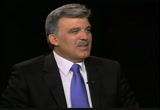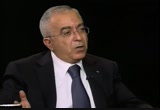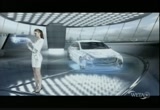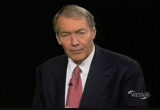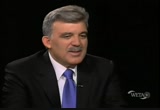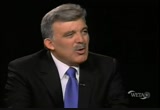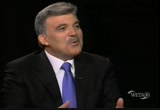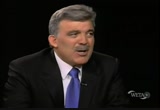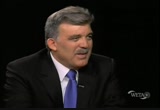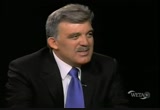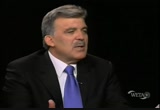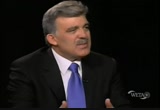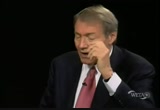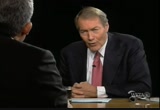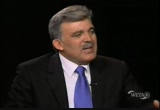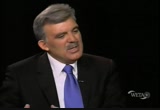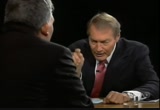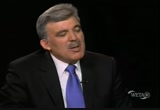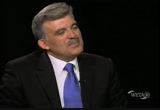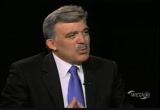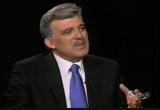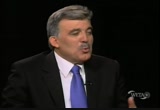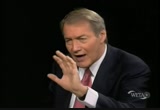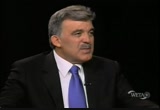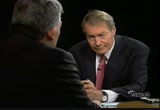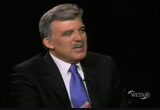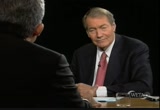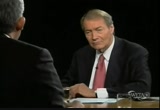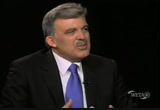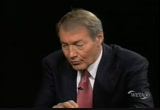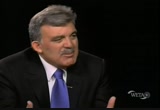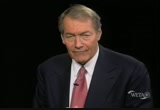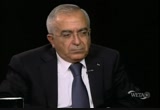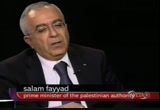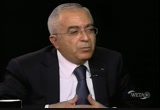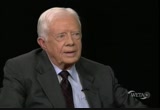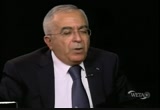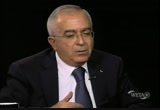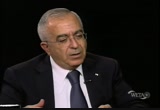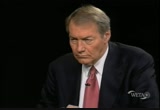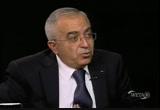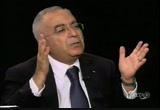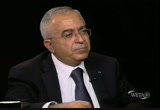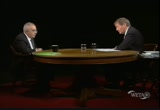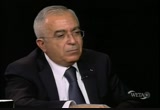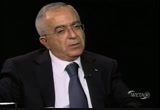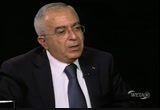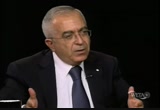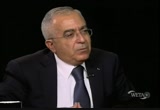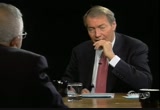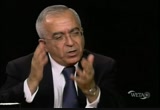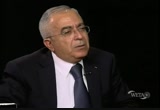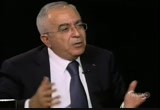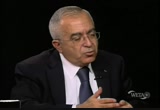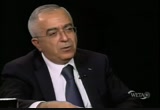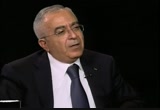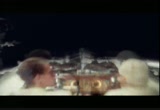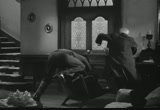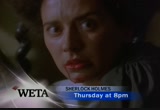tv Charlie Rose PBS September 21, 2010 11:00pm-12:00am EDT
11:00 pm
there's no stability and security and as i said earlier, so therefore they're already important for us. because many conflicts are around us. so therefore our attempt, our word and our insistence to contribute to the solution of the problems is appreciated. >> couric: and the prime minister of the palestinian authority, salam fayyad. >> it's one that's based definitely on dealing violence out of the equation for sure. that's our interest. that's how we defined it. from our point of view. it happens to be consistent with obligations that we took on the road map and going back to 1993.
11:01 pm
it's in our best interest, we're not doing no one else a favor but ourselves when we subscribe to nonviolence. as a really key component to what we have to do to get to freedom. >> couric: a program note: our interview with the c.e.o. of google, eric schmidt, will be seen at a later date. tonight, the president of turkey and the prime minister of the palestinian authority when we continue.
11:02 pm
captioning sponsored by rose communications from our studios in new york city, this is charlie rose. >> rose: abdullah gul is here, he's the president of turkey, a key u.s. ally and nato member, turkey has a new presence on the international stage as one of the fastest-growing economies in the world. it seeks to mediate in the region's most difficult conflicts and it has not shied away from conflict. relations with israel are tense after the israeli raid on the gaza-bound flotilla last spring. at home, the turkish government continues a path of democratic
11:03 pm
reform, waiting for membership in the european union. president gul is in new york for the united nations general assembly. i'm pleased to have him back at this table. welcome. >> thank you very much. >> rose: very good to see you again. >> it's always nice to be together. >> rose: tell me where you see turkey today. its role, its opportunity, its challenge. >> turkey is a unique position. first of all, we have been negotiating with the european union for the full membership. this means that turkey is adopting e.u. standards. this means that democratic standards of turkey is being
11:04 pm
upgrated to the e.u. so this is something very much meaningful. a muslim country is fulfilling the democracy. of course, this is making turkey very powerful. so power is power in turkey also an turkey is becoming a source of inspiration for the region. we have capacity to talk to all of them and our foreign policy is very positive. we have a positive agenda. we used to deal only with our problem in the past, but now we are trying to contribute to the problem of others in the region. this means that we own the
11:05 pm
region. regional ownership is very much important for the stability and security of the region. if there is stability and security then there will be cooperation and then there will be welfare in the region. it's what we have been doing. of course, our relation with america is one of the main pillars of our foreign policy. so we are the members of nato since 1952, before many countries and our relationship is very much important for us. >> rose: let me talk about the european union for just a second, because some people think turkey-- some-- has less interest. and your prime minister said that's not true. turkey very much wants to be part of europe and the european union. >> it's true.
11:06 pm
it's very much seen, you see. for sometimes we have been adopt ing reforms in turkey. these are only parallel to e.u. we have started the negotiation and we have been pushing. unfortunately because of domestic policies of some member countries, their approach is changing from time to time. but none of them is saying that negotiations should stop. so the negotiation is going on and this is a strategic issue for us and it's also the party policies. party politics in turkey. so that means that the state policy and it's our priority
11:07 pm
issue. >> rose: what is the... what's the impact of the referendum? >> referendum i first of all, all the amendments, the items, they were put in front of the people. they were related to e.u. it means that all the items in the referendum, they fall until the e.u. framework. since it has been accepted our standards in different fields is upgraded. so it is a positive impact and it has been received very well even though they did vote in favor of it. i'm sure that the majority of
11:08 pm
the people they didn't work for it. they are happy with the items, with the amendments. they don't have any problem with the amendments. >> rose: how do you view the united states? >> well, the united states is a superpower, of course, and has to deal with many issues. cannot focus on the americans' problems inside, so therefore from afghanistan to balkans, from terror to energy, so there's so many, in fact, issues that the united states, america, should deal with. something is good that's very much interesting. americans agenda and turkish agenda is almost overlapping. i don't think there are many countries like that.
11:09 pm
for instance, america is dealing with afghanistan. america is dealing with middle east. america is dealing with balkans. america is dealing with terror and energy transportation. diversification of energy source s. we have the same agenda. we have been dealing, also, with these issues. it's good that we are being coordinating it. we have the same views, you see. so i don't think there are many companies in the world that they have the same agenda. >> rose: you also have a good relationship with iran. >> iran is our neighbor. and they have different regimes. we are democrat and we are
11:10 pm
trying to be member of the european union so this is different, of course. but if you have a neighbor definitely you are... you want to be friendly and you want cooperation with them. we've had a very stable border with iran since 1659. so there's no border problem. there's no conflict. >> rose: you don't support sanctions against iran. >> u.n. sanctions is binding us also. >> rose: right. >> so therefore we are are applying this. we are arguing our reports to the u.n. committee. but since we are neighbors, if there is something not pulling in factions that is creating it,
11:11 pm
that is taking place. >> rose: do you believe sanctions will have an impact on iran? >> in general not just related to iran my view is this: sanctions are not working well, you see, because then you imply sanctions. to whom we are going to punish? the government or the people or what section of the people. and also the people they get hostile to those... using sanctions, you see, so it's... not very much workable, you see. so therefore that is not very useful. >> rose: so as an american friend, a a friend of iran, so... and the american and
11:12 pm
european sue that it's unacceptable risk for iran to have nuclear weapons. >> well, for us if iran is having nuclear weapons, more dangerous for us than america. >> rose: yes. >> because we never wish to see any neighbor with a nuclear weapon. it means that two friends, neighbors are walking together, one has the gun, another doesn't have, saw the gun, who has, he will have irresponsible behavior so therefore turkey as a neighbor to iran will never see this. will never... >> rose: so do you believe iran wants nuclear weapons?
11:13 pm
>> i cannot say this. iran is the member of international atomic energy and iran is the... part of... >> rose: the nonproliferation. >> n.p.t. so iran is getting out from atomic energy but iran should be transparent to us so this is the problem, you see. we want to see that this problem, this whole diplomatic way. but definitely this should be solved. >> rose: can turkey play a role? >> i think we have capacity to help, at least, because we are neighbors, we are able to talk. on the one side our alliance, member of nato very good strong relation with america. on the other side, iran is our
11:14 pm
neighbor. so we are in a position to talk. >> rose: i'm told that trade and the relationship between turkey and iran has grown. >> turkey depends on energy we don't have oil, we don't gas. >> rose: (laughs) right. you need to find it. >> so we are getting gas. in fact, we are getting gas from iran. iran is getting gas from turkmenistan. so... but they are selling it to us, you see. we wish to sell them, of course, russia wants to sell them. china wants to sell them. american companies are also in different ways selling them. so what is important here? the sanctions should be respect ed and sanctions, all those items fallen into sanction
11:15 pm
s we have to apply this. so as i said, sanctions are binding us, also. we are very careful on that. >> rose: what can turkey do then? give me a sense of what you would say to president obama? and what would you say to president ahmadinejad? >> first of all, it should be known that... because i know perception, you see. we are not undermining american policies. on the other side, we are coordinating, in fact, and we are talking. we have the capacity-- again, i will repeat this-- we have the capacity to help this issue. i think our friends should be happy with this. so we are doing our best and... >> rose: is it happening? i mean, are you talking to the
11:16 pm
iranians on behalf of the americans or about americans? >> i think something is happening. something is happening. maybe small progress but something is happening. if you see that after this, something is happening. >> rose: whatting? >> well, at least some statements were made, some meetings took place and some wishes have been expressed. i'm not optimistic, i'm very much realistic. but at least something is happening. good values, you see. and our role is being appreciated by our allies. by our american friends and also the europeans. i think we have to be determined but work hard because there are
11:17 pm
two ways. the one way is war. >> rose: right. >> another way is diplomat zi. we have to prepare... prepare the diplomat zi, of course. this doesn't mean that we should prepare ourselves to see with the weapon. no, that's not the question. first turkey rejects this. no one wants to see that in the neighborhood. so turkey turkey's intention should be understood. sneund and do you think the iranians are responsive to that? >> from time to time yes, from time to time no. (laughter). >> rose: but you are a little bit optimistic? >>
11:18 pm
>> at least something is moving. >> let me come back to president obama. when he addressed your parliament he called the u.s./turkey relationship a model partnership. are you getting everything from the united states that you want? >> first of all, i want to appreciate here once more that president obama, he made his first visit to turkey and he made it excellent, wonderful speech in our arlen parliament e all appreciated this and he send a message from ankara to the region. as i said before, our relation with america is one of the main pillars of our foreign policies an we have been in constant contact and coordination with america. of course, from time to time we have different priorities but we
11:19 pm
are working very closely. the administration is also... also president obama's multilateral policies, international issues is being also appreciated everywhere, you see. >> rose: and how about his cairo speech? >> that was an excellent speech, of course. >> rose: the islamic community views him how? >> first of all, president obama made the change in the mind of the muslim people that is very important and many people they are thinking this is very good, you see. because of president obama, his speech, his message changed the
11:20 pm
war. >> rose: some people in different political persuasions worry about turkey being in every way a secular state. because you make no... i mean... go ahead. >> well, you are the ski a democratic and secular state. i want to draw the attention here. turkey adopting european standards so turkey's direction is very clear. so we have to question the values. our values are the common values , modern values. look at the u.k.
11:21 pm
commonwealth from canada to subcontinent, u.k. is having good relationship. turkey is also the kind of political advantages we have been using this... i think this should be seen quite normally. france, spain. spain's relation to latin america, very special agreement. >> rose: so you're saying that the relationship you can have with the cross section of people within the islamic community and otherwise? president assad in an interview with me that was widely e quoted when i asked "what is your fear?" and he said "making sure syria remains a secular state." do you have that fear at all
11:22 pm
about you are the economy? >> there's not any question, any debate on if turkey should be secular or not secular. there's a consensus on this use it's not a question that turkish not be a secular state. secularism means the fundamental part of the constitution. no one wants to change this. religious freedom for all the religion is different. but state and religion should be separated if they are unhappy with this. >> rose: what, then, worries you the most about the future of turkey? >> i stability in the region. >> rose: from? >> from middle east, asia,
11:23 pm
afghanistan, caucasus. it's why we're repeating security and stability. there's no stability and security there and as i said earlier it's very much important for us. because many conflicts, hot issues are around us. so therefore our attempt, our world and our insistence to contribute to the solution of the problems is appreciated. >> rose: appreciated and needed. so therefore has there been any progress in terms of turkey serves as some kind of bridge between syria and israel? >> we tried hard. >> rose: i know you did. but you broke it off after the... >> it wasn't because of us, you
11:24 pm
see. you're about to... and so it's good intention from both sides. not because of us but because we have that capacity. we had good relation with israel and we have good relations with all arab countries. i think this is an asset. >> rose: was it you that said israel must apologize for the incident before there could be... was that you? >> first of all, we have to just look at what happened, you see. humanitarian aid convoy led by mostly turks but people from six
11:25 pm
countries, academics, intellectuals, some activists. and these ships were attacked in the international waters. this is very much important. then nine people were killed. eight turks and one turkish american. >> rose: right. now, should we ignore this? can we ignore this? can we forget this? with k we act as if nothing happened? now it has happened. what happens? two ways. in the old years they used to fight each other. in the modern days what is the way? international law. so that's what we're asking, you see. >> rose: what are you asking? >> an apology.
11:26 pm
>> rose: but are you demanding an apology? >> definitely, of course. there was a great... it was a crime, first of all. >> rose: so if they don't apologize, what's the consequence? >> it's up to them. >> rose: but if they don't apologize, what's the consequences? >> it's up to them. it's up so them. so it means that they don't need turkey in the region. it's up to them. it means that they don't value our relationship with them. it's up to them. >> rose: they think they were set up. >> international law should be applied. >> rose: where is the kurdish issue snowed. >> since the democratic standards of turkey's being upgraded, the people are happy and they are complained as being
11:27 pm
removed but the terror is preventing us more. there's a terrorist organization they are killing, civilians. >> rose: what's the name of t organization? >> p.k.k. it's call. >> rose: yeah, that's what i was talking about. you think the p.k.k. is a threat to your government? >> not to our government. to turkey and to region. >> rose: and where do you think they get their support? >> you know, there's no authority. there's no strong security force. northern iraq became a safe haven for them. it's why i said the turmoil in
11:28 pm
iraq had negative consequences on us. that's why we are worrying about another war in the region. >> rose: another war in the region between... >> iran. >> rose: in other words, you worry that somebody might take military action against iran to stop them from developing a nuclear weapon? >> yes. >> rose: and what else do you worry about? >> well, if another war is there then there will be immigration... >> rose: where is war most likely to happen with iran? >> i'm not saying that it will happen because now we all are going diplomatic way and there's some good steps going on there. so i hope that this issue will be solveed through diplomacy. >> rose: clearly with your economic success, with your
11:29 pm
efforts to qualify for membership in the european union, with your relationship with syria, iran, you can play a very, very important if not the most important role in the region. >> rose: you're right. we have 800 kilometer board we are iran... with syria. and our policies was questioned at the beginning. our engagement policies. but now this is america. so you are right. i have been repeating that we have the capacity. we have been advising them. we have been telling them that look at the democracy, the
11:30 pm
peaceful way. it's the good things. free market economy. >> rose: you've been telling the syrians this? >> of course. the syrians. it's been a source of inspiration for them, in fact. >> rose: it is. >> they have been following very closely and indirectly we've been showing them. >> rose: thank you, pleasure to have you back on the program. >> thank you. it's always good. >> rose: salam fayyad is here. he is prime minister of the palestinian national authority, a former world bank economist, he has a vital role in the effort to reach a two-state solution. for the past year, he's been building the foundations of a palestinian state on the west bank. with u.s. and european union support, he's revamp it had security forces and violence is down. he has attracted foreign investors and has resuscitated the economy. it grew by an estimated 9% in the first half of this year.
11:31 pm
israel and the palestinians have returned to direct negotiations but many believe that the ground-up effort is the best thing going these days. one of those people is tony blair, the quartet's middle east envoy. >> it's an on-the-ground reality problem. if israel is not sure of its security, if it is not sure that anyone palestinian state will be properly governed, well governed, they're not going to allow what's happened in gaza to happen on the west bank. in gaza it's mannable, in west bank it's not. and that's why the program of change in palestine is so important because what he's really saying is look, i understand it, but what's more, for ordinary palestinians they want security, they want the rule of law, they want proper government. so irrespective of what israel wants, what i, the palestinian prime minister want and president abbas, the palestinian president want, is we want proper governance for us. >> rose: prime minister fayyad is in new york for the united nations general assembly and the
11:32 pm
clinton global initiative. i am pleased to have him back on this program. welcome. >> pleasure. thank you. >> rose: speaking of what tony blair just said and where you are, i'm looking an an executive summary from the world bank about your efforts and it says point "a", the viability of a future palestinian state will be determined by the strength of its institutions and its ability to sustain economic growth. point two, if the palestinian authority, p.a., maintains its current performance in institution building and delivery of public services, it is well positioned for the establishment of a state at any point in the near future. >> music to my ears. that's the first point i agree with very much. and this comes at about the halfway mark in the implementation of our two-year statehood program which we launched in august of 2009. but three weeks ago we released
11:33 pm
a document that actually outlines priority interventions by the palestinian authority. and what remains of the lifetime of this two-year program which is supposed to be taking us where we will have completed the task in getting ready for statehood in the form of strong competent institutions on the state plus, of course, having implemented a large number of infrastructure projects to have. to make determination, it's a judgment on the quality of what we have been able to accomplish over the past year certainly something that gives us hope that we can come fleet that we started a year ago in the form of statehood, in the form of being pretty much the institutions of the state.
11:34 pm
>> rose: here is what former president jimmy carter said in an interview i did with him to be seen later this week. >> i would like to see the obama administration along with the other quartet members say this is a proposal that we think is fair to the israel and the palestinians and we demand both sides accept it. >> rose: and so just suppose dedemand it. benjamin netanyahu has to deal with his coalition. so what would you do to... >> one is for the united nations to recognize palestine as a nation. and that's been proposed by many of the european leaders including the past foreign ministers. >> rose: what boundaries. >> with unspecified boundaries. >> rose: so here we recognize it as a state. they've got statehood and they've got a president and prime minister.
11:35 pm
and they're beginning to have some kind of self-government under prime minister fayyad. >> i would guess within a few months they would have 130 or 140 nations that would recognize the nation of palestine. and that would be a major step forward because you would see you would see two palestinian factions come together and they would have another election, the fourth election i have monitor it had first three elections. >> rose: with the plan you have, understanding what you just said so you establish a state by 2012, >> >> well, the plan actually is for us to be ready for statehood by around mid-2011. >> rose: so mid-2011. what happens? give me the process that takes place. you establish a state, you go to the nations for... >> we're not there yet.
11:36 pm
we've been preoccupied on this track that i've called statehood buildings. base quli capacity building. getting ready for statehood is to complete the task that the p.a. started since its inception which is the main task of transforming itself from an interim governing authority into pretty much state of palestine with all the institutions of state and also of governance. something which actually did not proceed as planned in the early going and the efforts stopped with the failings of the political process for about 17 years now, as a matter of fact. we decided going back to around mid-2009, last year, was to actually put together a package of measures, intended mainly at actually putting all of this effort together in a way that
11:37 pm
made sense relative to two things, number one, what it is that have been established over the preceding year and, b, where it is we intended to be in terms of standard. so coming up with a list of measures, interventions we thought would be necessary and would be ready for statehood. the idea was to have a link between that statehood building capacity... capacity building track and the political track. the political process. our perception was and continues to be that these two threats have to go hand in hand. one cannot be intended to be in
11:38 pm
lieu of the other part of it is what we are trying to do. getting ready for statehood. >> rose: do you believe the israelis and by this i mean the government want you to succeed? >> i tell you we anticipated difficulties when we launch that program we don't anticipate it's going to be easy in terms of implementation possibilities given the occupation and so far as movement and access issues. but i actually... the process to that program which we launched in august of last year, that said explicitly that it's our intention to proceed with this and do it despite the occupation with a vie to help bring about
11:39 pm
its levels sooner than later. that was the idea. in the process hoping to transform palestinian statehood from the realm of the conceptual to the realm of the possibility and ultimately into reality. it's something that basically the takes into account that this could bring along by way of transformative power. given the dynamics models for, our people and israelis as well in terms of getting them together to invest in the possibility that actually the two state solution concept could materialize. i do not believe there is majority on either side that believes the two state solution
11:40 pm
can be realized into. up a majority of people on both sides believe... >> believe in the two-state solution. >> rose: in that idea. that's the better solution. >> exactly, exactly. >> rose: but you don't think there's a majority in either place... >> that believes it can happen. and that's my sense and i think... >> rose: so you need confidence building. instead of going back to the segments not what he said about the state of palestine, the reality of it. good part of the motivation rationale underlying the effort beginning august last year is to try to transform, to try to get people to believe in this being possible. that, in fact, this can't happen. and you start out with a
11:41 pm
foundation principles, values on which the two states of palestine were to be founded then you say this is what i really need to do or see happen. in order for us to have systems of government that measure up to those values. then you begin to implement and with each success that you have in cements your programs despite adversity, the fact that we actually made them was that more and more people begin to invest in this. i don't mean materially, but sentimentally, politically. >> rose: right. >> and that's the power of this program. it has proven to be highly transformative. certainly on our side.
11:42 pm
>> rose: and what about the divisions within the palestinian community? >> major impediment because at the end of the day we can do all we need to do and it looks like we are well on our way. but if we have not by then managed to put the country back together that would be disqualified because the state you're looking for is the state that's going to emerge in gaza and west bank. >> it will not be a palestinian state if you can not end the division between the palestinian authority and hamas? >> that's what i believe, yes. >> rose: and how do you do that? >> well, through a variety of ways. by dealing with the shortcomings of the task. there's a blockade imposed on gaza for too long. especially intensified since 2007. that made life extremely difficult for some 111.5 million. >> rose: do you think the
11:43 pm
israelis did that because of security? >> that's... >> rose: or because they wanted to see hamas fail? >> you know, as a matter of fact this goes back to the' 0s, the israelis had... i remember a posture on security matters that pretty much said there's got to be closure, closure in the sense of borders being closed down and all. that was the security doctrine, pretty much and i do not believe it's changed since then. we have gone through periods where the closure was either strict or too strict. but i do not believe there was a period of time but for maybe brief intervals where passages were fully opened where movement was completely free. it's just a question of degree. mid-2007 onward, that blockade i think many on the israelis side
11:44 pm
knew that this was counterproductive relative to their own objectives. this definitely was wrong and wrong headed policy. now israel is easing that blockade. >> rose: partly because of world pressure or partly because of repercussions? >> and the aftermath of flotillas, yes. it started to ease and we hope this can be carried forward. i think this creates a better environment for reconciliation on the palestinian side, for sure. >> rose: so lifting the blockade would create a better opportunity, a better chance for a somehow eliminating the conflict between palestinian authority and hamas? >> the other thing would be for us palestinians, so actually not only its focus, instead of having an open-ended debate on just about everything, including
11:45 pm
differences in terms of political programs or platforms, the significant differences between hamas and that of the p.l.o., which represents the palestinian people. that's a problem for sure. but i do believe it would be much better if the focus is at least for now exclusively on matters that are for all of us and that's security. the hours, meaning... it's one that's based... >> rose: what do you define security as? >> security doctrine, i said. >> rose: oh, security doctrine having to do with israel security? >> our own. what it is that we want our security services to do what is their basic mission? what does security mean? is it only an israeli interest as it has been for much too long or is it defined as it should be equally a palestinian interest
11:46 pm
as well. just as it is an israeli one. if you look at things this way, you start to have a better balance and the way you approach it. then it begins to be much easier because as a matter of fact everyone... there is a little bit of confusion and i think highly destructive, if you will, on something as basic as security, more essential services and a responsible government. what is it that we're here for? are we merely a security project for israel? the occupying power with all the difficulties and complications that will be entailed by this kind of understanding or concept having security doctrine defined clearly in the first order of business our security doctrine is one that is based definitely on dealing violence out of the equation for sure that's our interest. that's how we define it from our
11:47 pm
point of view. it happens to be consistent with obligations that we took on the road map and before as going back to 1993. well and good. but it's in our best interest. we're doing a favor for ourselves. as a really key component to what. >> to do to get to freep. >> rose: from wherever it comes. >> yes. we're against it for certain and we have acted very much consistent with that. >> rose: and you think that's possible? you could sit down with hamas and get them to come to that point of view or somewhere near that point of view? >> rose: charlie, i think it should be possible. i have just told you with clarity what our security doctrine is. we say what it is with clarity. if you look at what has been happen in gaza strip over more
11:48 pm
than a year now, you will find that hamas has been acting ineffectively more or less consistent with that. it has been trying to conciliate decision making if one can put it that way under its control related to security matters for sure. it has been trying to avoid having missile launched into israel. it's no secret. effectively, that's what they're doing. that's what you effectively practice. to that which you say is your policy. i think it's about time for us to deal with this and be honest about it in the interest of our own people and the interest of enabling us... >> rose: why do you think hamas has been doing that? because they realized it wasn't in their interest to be shelling israel or they saw the aftermath of the war and what it did to
11:49 pm
them and their institutions? >> that's probably what it is. in fact, i should not really even speculate on this, those statements that i've seen attributed to hamas leaders. of course, it's not in our interests, it's not in the interest of the palestinian people for there to be violence. i've seen this after a viz stoit hamas' leadership. effectively this is what they have been trying to do now they have not really actually stated this as a security doctrine on the basis of wanting to see the clinian people govern to move from that which you practice effectively. >> i believe once we have that as a palestinian, it should be much better for us to project ourselves as palestinian, one
11:50 pm
thing to coexist, one thing to get too freedom through nonviolence. >> and it's possible to create a governing coalition? >> rose: why not? why not? problems that we have politically actually reflect nothing more than political pluralism. and that's supposed to be a good thing. there are significant differences of views between us and hamas. there's no question about that. but that's hardly a unique phenomenon to us palestinians. >> rose: is it primarily about an attitude towards israel or is it some theological or ideological display? >> it's probably a combination. a lot... way too much focus has been give on the the former in the sense of hamas' position vis-a-vis hamas' agreements in terms of recognizing israel, in terms of reunderstand in@ning violence.
11:51 pm
but there are other differences in terms of the difference on social culture that exists in our society as they do in other societies. these areer issues that can be debated and discussed. a way must be found for us to manage those differences. that is what depp zi ought to be about. >> rose: how does this dialogue start? >> it has started but in my view, charlie, it has focused way too much on those political differences and your know, i don't see a resolution if that continues to be the focus. >> rose: if the focus is of the differences. .. >> i think we need to focus on security. i would not want to belittle those differences but we need not look further than to our next door neighbors in israel. they have a coalition and i do not know-- perhaps there's not more than one party on that coalition whose platform accepts or... the notion of two states. the rest don't.
11:52 pm
yet israel has a government and is able to deal with the international community. why can't we do the same. >> rose: let me talk quickly about the economy. everybody talks about the extraordinary growth rate you've had. is that sustainable? >> very good question. >> good question. that happened on the part of fiscal stimulus in 2007. actually made possible by large sums of external assistance. and i think that carried the economy pretty much through the period since 2007 up until so far this year. the process was aided by beginning of easing of restrictions on mobility movement in the west bank around mid-2009 onward it came from government spending, easing
11:53 pm
restrictions on mobility into gaza, movement of goods into gaza and that, plains why the economy has rebounded there. if the diagnosis is accurate-- and i believe it is-- the question is how sustainable is it going to be? my answer is that it's not going to be sustainable. for one thing we have been going through a period of withdrawal through fiscal stimulus since 2007 onward. indeed, charlie, our economy is well positioned to go on for many years to come. number one, after many years up until late 2007 of either recessionary conditions or outright recessions. our economy happens to be next door to an economy that's much larger than it. our economy is only 4% of the size of the israeli economy and
11:54 pm
laws of physics would predict substantial improvement. actually once things begin to normalize. >> when you dream, you dream that a palestinian state could be created which becomes a model for the arab world. >> we're trying our best, as a matter of fact. not only in terms of basic infrastructure in the physical sense but the software of it, if you will. and you will find that our program really diverts a great deal of space to matters of culture, as a matter of fact once again most basic values on which that is going to be founded. values of equality, equal opportunity, nondiscrimination, openness to cultural contributions of others and coexistence, that's what this is about for sure. >> rose: home stroach freedom,
11:55 pm
11:59 pm
89 Views
IN COLLECTIONS
WETA (PBS) Television Archive
Television Archive  Television Archive News Search Service
Television Archive News Search Service 
Uploaded by TV Archive on

 Live Music Archive
Live Music Archive Librivox Free Audio
Librivox Free Audio Metropolitan Museum
Metropolitan Museum Cleveland Museum of Art
Cleveland Museum of Art Internet Arcade
Internet Arcade Console Living Room
Console Living Room Books to Borrow
Books to Borrow Open Library
Open Library TV News
TV News Understanding 9/11
Understanding 9/11